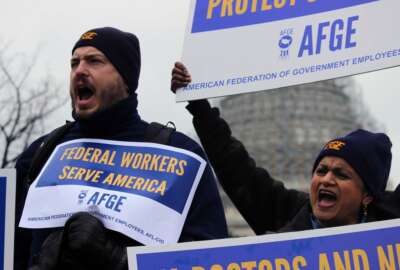The Federal Labor Relations Authority delivered a blow to the Department of Veterans Affairs and its implementation of the VA Accountability and Whistleblower Protection Act, the 2017 law seen as a signature legislative achievement for the Trump administration.
The FLRA earlier this month upheld a decision from an independent arbitrator, which found VA had violated its 2011 collective bargaining agreement with the American Federation of Government Employees when it failed to provide veterans service representatives at the Veterans Benefits Administration 90 days to improve their performance before firing, demoting or suspending them.
The arbitrator agreed with the union, ruling two years ago that VA had violated its contract when it imposed shorter performance improvement periods on its employees.
In issuing its award, the arbitrator called on VA to rescind any adverse actions and reinstate any employees who had been fired, demoted or suspended without a 90-day performance improvement period — with back pay, restored leave and other benefits.
The award applied to all VA bargaining unit employees, and earlier this month, the FLRA upheld the arbitrator’s decision.
AFGE said it’s still reviewing exactly how many VA employees should be reinstated and owed back pay based on the authority’s determination, but an attorney for the union estimated at least 1,000 people are impacted.
VA spokeswoman Christina Noel said the department is reviewing the FLRA decision.
The authority’s decision stems from a grievance AFGE filed back in 2017 over VA’s implementation of the Accountability and Whistleblower Protection Act. The union argued the department had implemented portions of the law in a manner that was inconsistent with its collective bargaining agreement. VA, AFGE said, should have bargained with the union over the implementation of the performance management changes.
According to an article in AFGE’s 2011 master agreement, employees were supposed to receive at least 90 days to improve their performance before their supervisors can begin the disciplinary process.
But in implementing the Accountability Act, VBA informed its employees they would have 30 days to make needed changes to their performance. VBA employees had previously told Federal News Network the new performance expectations made them fear for their jobs.
VA, however, had argued the Accountability Act superseded the AFGE contract.
In 2018, arbitrator Jerome Ross ruled in the union’s favor. The Accountability Act, he said, only provides a timeline for notice, response, final decision and appeal of a firing, suspension or demotion. The law doesn’t describe what the department “may or should do prior to any decision to remove, demote or suspend employees based on performance,” Ross said.
VA filed exceptions to the arbitrator’s decision in late 2018. The FLRA reviewed the decision and offered its own opinion last week.
In its decision, the authority agreed with the arbitrator’s view of the Accountability Act, confirming the law only provided specific timelines for VA’s handling of disciplinary actions — not what happens before an action is taken.
But Colleen Duffy-Kiko, the FLRA chairman, disagreed in part with Ross’ view of the Accountability Act and said the law did, in fact, supersede articles in the AFGE collective bargaining agreement. Any performance improvement period that prevents VA from taking an adverse action within 15 days is a violation of the Accountability Act, she said.
In addition, Duffy-Kiko said the arbitrator’s award and the authority’s decision to uphold it ignored the intent and purpose of the VA Accountability and Whistleblower Protection Act, which Congress passed in 2017.
“The act’s legislative history demonstrates a clear intent to streamline the VA’s cumbersome process for taking adverse actions against employees unfit to serve our nation’s veterans due to poor performance or misconduct,” she wrote in her dissent.
All members of the authority, however, rejected VA’s argument that Ross’ decision would restrict the department’s ability to manage and assign work to its employees.
“While the agency is correct in asserting that management has the right to supervise and evaluate employees, it is incorrect in claiming that the award excessively interferes with this right,” the authority wrote. “Instead, the award requires the agency to comply with [the bargaining agreement] — in that it must provide employees a PIP and 90 calendar days to improve before initiating a performance‑based action. Because the award merely requires the agency to comply with a provision it agreed to, it cannot excessively interfere with its management right to supervise and evaluate employees.”
VA and President Donald Trump himself have consistently said the Accountability and Whistleblower Protection Act has made it easier for the department to fire thousands of employees. But VA data from its first year with the new law showed firings and other disciplinary actions mostly occurred among custodians, cafeteria workers and housekeepers, not senior leaders and decision-makers.
The department disciplined few senior leaders and executives between 2017 and 2018, a trend that appears to have continued in more recent years.
Between October 2018 and May 2020, VA’s accountability office recommended disciplinary action against six senior leaders for misconduct and one supervisor for whistleblower retaliation during the 18-month reporting period.
Copyright
© 2024 Federal News Network. All rights reserved. This website is not intended for users located within the European Economic Area.
 Exclusive
Exclusive  Exclusive
Exclusive